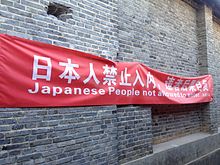
Anti-Japanese sentiment in China is an issue which has modern roots (post-1868). Modern anti-Japanese sentiment in China is frequently rooted in nationalist or historical conflicts, for example, it is rooted in the atrocities and the war crimes which Imperial Japan committed in China during the First Sino-Japanese War, the Boxer Rebellion (Eight-Nation Alliance), the Siege of Tsingtao, the Second Sino-Japanese War and Japan's history textbook controversies.
Bitterness persists in China as a result of the Second Sino-Japanese War and Japan's post-war actions. At least to some extent, this sentiment may also be influenced by issues which effect Chinese people in Japan.
According to a 2017 BBC World Service poll, mainland Chinese people hold the largest anti-Japanese sentiment in the world, with 75% of Chinese people viewing Japan's influence negatively, and 22% expressing a positive view. Anti-Japanese sentiment in China was at its highest in 2014 since the poll was first conducted in 2006 and was up 16 percent over the previous year.[citation needed] However, anti-Japanese sentiment significantly decreased by 2018; a poll done in 2018 by Genron NPO showed that 42.2% of Chinese people looked positively to Japan, up from 31.5% in 2017.[1]
- ^ "Poll Shows Over 40% of Chinese Have a Favorable View of Japan". nippon.com. 2018-11-08. Archived from the original on 2020-11-17. Retrieved 2020-01-31.